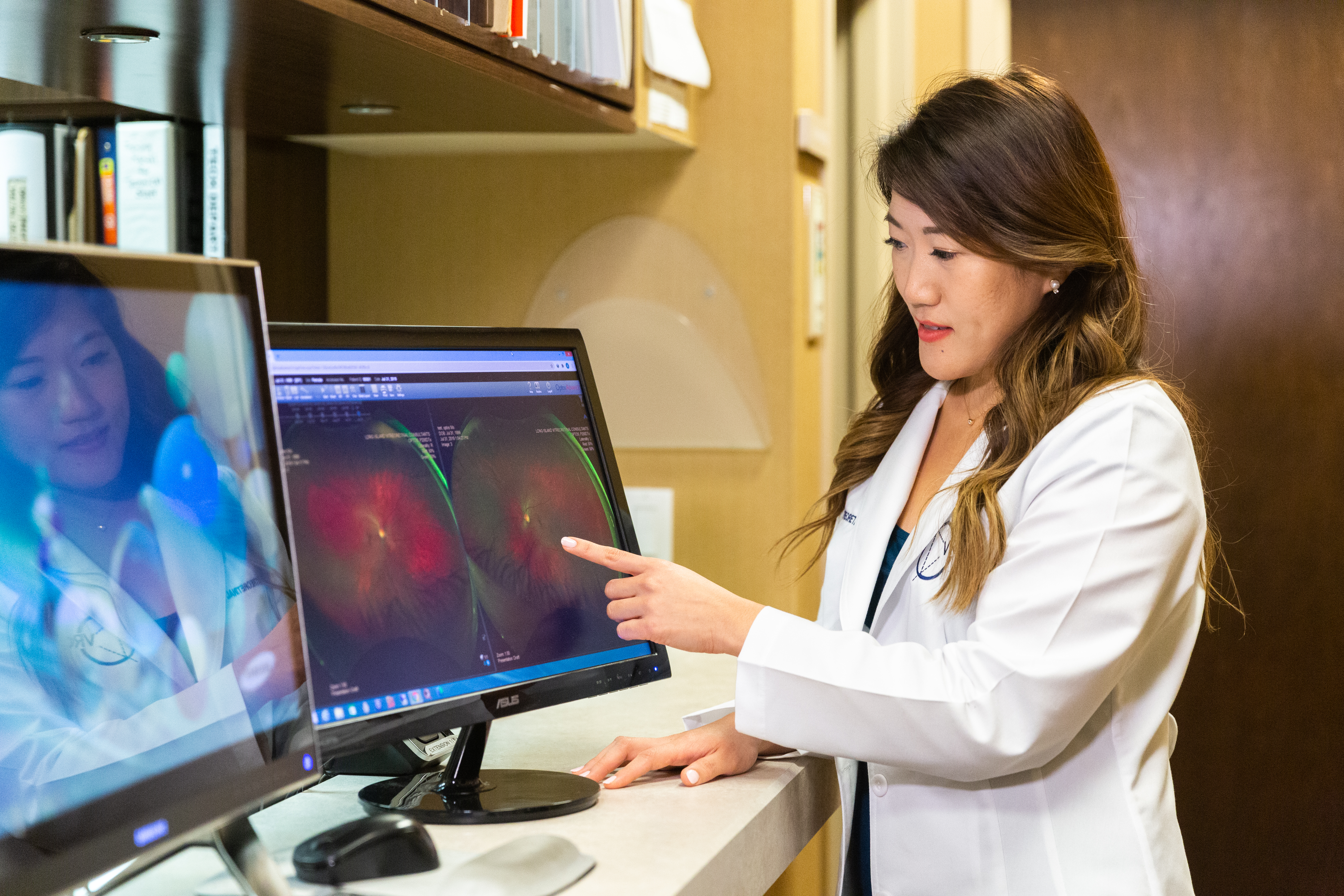What Does a Retina Specialist Do?

When it comes to the world of vision care, retina specialists are tasked with protecting the most essential component of the eye responsible for vision – the retina. Lining the back wall of the eye, the retina is a light-sensitive tissue responsible for capturing light signals and transmitting them as neural impulses to the brain. Because of the retina’s size, importance, delicate nature, and location, diagnostic care and treatment require a very specific set of skills and mastery.
To attain this level of skill, retina specialists undergo extensive training and education after completing their ophthalmology residency by completing a fellowship in medical and surgical disorders of the retina and vitreous.
Conditions Treated by Retina Specialists
Retina specialists treat a wide variety of conditions affecting the retina, macula (the retina’s center), and vitreous. Among these conditions are:
- Age-related macular degeneration
- Geographic atrophy
- Diabetic retinopathy
- Retinal tears and detachments
- Retinal vascular occlusions
Some retina specialists may also specialize in other aspects of ophthalmology, such as pediatric retinal care, ocular oncology, or uveitis.
The Role and Responsibilities of Retina Specialists
Retina specialists play a pivotal role in accurately diagnosing a range of retinal conditions through a meticulous combination of cutting-edge technologies and comprehensive patient examinations. This diagnostic process enables retina specialists to pinpoint conditions like diabetic retinopathy, macular degeneration, and retinal detachment, laying the foundation for personalized and effective treatment plans tailored to each patient's unique needs.
Retinal Diagnostic and Testing Tools and Procedures
Retina specialists use a wide variety of advanced technologies and techniques to obtain detailed images of the retina, allowing for precise diagnosis and monitoring of retinal and macular conditions. Some of these methods include:
- Optical Coherence Tomography (OCT): An imaging technique that produces high-resolution cross-sectional images of the retina
- Fundus Photography: High-resolution color images of the retina.
- Fluorescein Angiography: An imaging technique in which a photosensitive dye is injected into the arm and travels up to the retinal vascular system, highlighting the retinal blood vessels and making them visible to be photographed.
- Ophthalmic Ultrasound: Using soundwaves, ultrasound captures sonar images of the inside of the eye.
- Electroretinography (ERG): Using electrodes placed on the cornea or the corners of the eye and forehead, this diagnostic method measures the retina’s photoreceptor response.
- Visual Evoked Potential (VEP): Using electrodes, this diagnostic method assesses the function of the visual cortex in the brain.
Retinal Treatment Specialties
When it comes to managing complex retinal conditions, retina specialists are equipped with a range of sophisticated treatment options, each tailored to address specific challenges. Some of these include:
- Intravitreal Injections: Treatment involving the administration of medication directly into the vitreous humor of the eye, targeting conditions such as wet age-related macular degeneration (AMD) and diabetic retinopathy. Intravitreal injections help to slow down disease progression and, in some cases, may improve visual outcomes.
- Surgical Interventions: Surgical procedures such as vitrectomy, scleral buckling, macular hole surgery, and retinal detachment repair all fall under the expertise of retina specialists. These surgeries often involve delicate maneuvers to repair or remove damaged tissue, restore retinal function, and improve vision.
- Laser Therapies: Laser therapy is commonly employed to treat conditions such as diabetic retinopathy and retinal tears. By using focused laser beams, retina specialists can either seal leaking blood vessels or create small scars to prevent the progression of certain retinal disorders. Laser therapy is often a crucial component of a comprehensive treatment plan, working in conjunction with other interventions to optimize patient outcomes.
Involvement in Retinal Research & Clinical Trials
In addition to clinical practice, retina specialists often actively contribute to the advancement of the field through participation in retinal research and clinical trials. These endeavors play a crucial role in exploring new treatments, refining existing therapies, and enhancing our understanding of retinal diseases.
By actively engaging in research, these specialists contribute valuable insights that can shape the future of retinal care. Their involvement allows them to stay abreast of the latest developments, ensuring that they can offer their patients access to cutting-edge treatments and interventions. This commitment to ongoing research not only enhances the knowledge base within the field but also underscores the dedication of retina specialists to delivering the highest standard of care to their patients.
Connect With a Retina Specialist Near You
Armed with specialized training and the most advanced technologies, retina specialists stand as guardians of vision by protecting the delicate retina. From accurate diagnosis to intricate treatments to cutting-edge research, they address a diverse range of retinal conditions and help improve the quality of life for countless patients.
As the largest network of retina practices in the United States, Retina Consultants of America is here to connect you with the leading retina specialists in your area. Search our network or contact us directly to find exceptional retinal care near you.